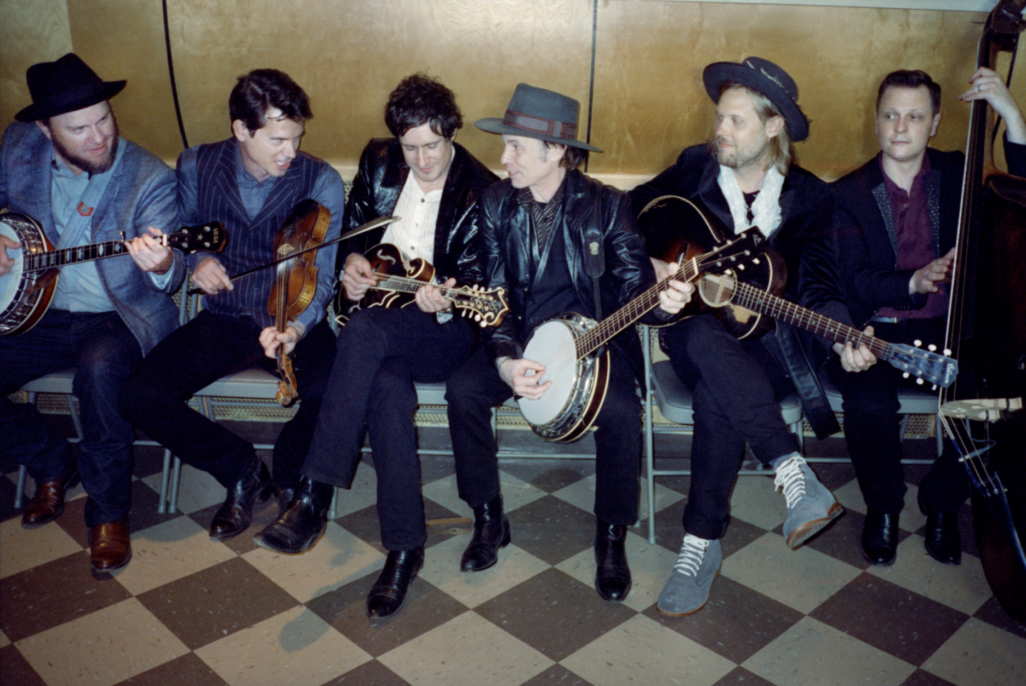In 1973 Bob Dylan recorded the chorus for Wagon Wheel but never finished the song. 25 years later, Ketch Secor of Old Crow Medicine Show took the plunge and added in verses. (Click here to watch the music video; you’ll recognise it.) The track went platinum in April 2013, and Old Crow’s connection with Dylan was cemented. Last year they recorded a live album from their Country Music Hall of Fame tribute show, 50 Years of Blonde on Blonde, to mark the 50th anniversary of Bob Dylan’s seminal double album. On the eve of the band’s upcoming Australian tour, Smith Journal caught up with OCMS co-founder Chris “Critter” Fuqua.
You commented once that old records like Blonde on Blonde reveal a kind of spontaneity and human error that we don’t see much in album production these days. Is your latest live recording a throwback to that old style?
I think the real magic in music is what some people might think of as mistakes, but which I don’t think are mistakes. The natural way that people play music together ebbs and flows. People are going to play different notes, or sing something a little different. I don’t believe in perfection. That’s kind of an illusion. I think people nowadays get a little too focused on getting it perfect, which is impossible since it’s all subjective, you know?
When Old Crow Medicine Show got started in the late ‘90s, there weren’t many young bands playing bluegrass. What was the appeal?
Ketch and I grew up in Virginia, in the Shenandoah Valley, and you’d think there would have been a lot of that kind of music going on, but there just wasn’t. Ketch was going down the road listening to John Hartford and Bob Dylan and Woody Guthrie, and I was getting into the Delta Blues, like Muddy Waters, and Texas blues stuff like Lightnin’ Hopkins. I don’t even know if it was a conscious decision; we were just going back in time. We got a chance to play with some old-timers at some of the festivals and in upstate New York, which was a real hotbed of Southern music, surprisingly. A lot of [musicians] had played out in California in the 1960s and ‘70s during the folk revival, curating that music and bringing it back to New York.
Nashville has changed a lot in recent years with modern artists like Dan Auerbach and Jack White moving to the city. What does it mean to be part of the music scene there today?
Oh yeah, there’s a lot of new blood. It’s funny, I don’t often think of myself as part of the music scene, but I guess I am. The music scene is just huge in Nashville, and there is so much more going on than just the big mega-star country. There are bluegrass bands, a big rock ‘n’ roll scene. There’s a resurgence of classic honky-tonk sounds. It’s just blowing up. It didn’t look like this 10 years ago. It’s quite a city.
In a way, your latest album 50 Years of Blonde on Blonde is the perfect reflection of Nashville today, combining the roots and traditions with something more modern.
Yeah, I don’t think people realise what Dylan did for Nashville. I don’t think they equate Dylan with Nashville, but it was a big thing.
What do you hope listeners and live audiences will get from the album?
If they don’t know anything about us, or if they know about us but not so much about Bob, they’ll just get to listen to a great live album. If people are Bob fans, I hope they’ll really appreciate the spirit and energy that we put into this new rendition of a classic Dylan album. This album was really important for pop, country music and rock ‘n’ roll, and it was also really important for the city of Nashville, it being recorded here 50 years ago.
Where do you send people visiting Nashville for the first time?
I recommend Arnold’s [Country Kitchen] for soul food. It’s famous for “meat and three” [meat or fish plus three sides], so that could be fried chicken, fried catfish, collard greens, chow-chow [Tennessee’s famous spicy relish], baked beans, banana pudding… It’s not good for you, but it’s good.
Will Australians hear some original Old Crow tunes in addition to the Blonde on Blonde tracks?
It’s always a mixed bag, but I think we’ll play a couple. We’ll be focusing on the Dylan album, but I can pretty much guarantee there will be a Wagon Wheel.
Do you play that around the campfire like the rest of us do?
I play it enough on the road [laughs]. I get my fill of Wagon Wheel.
(Published in September 2017 on smithjournal.com)
